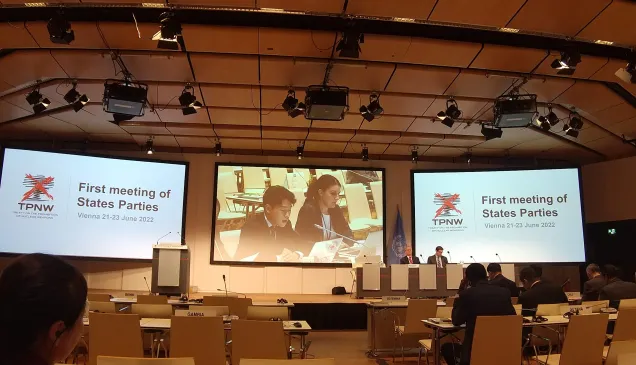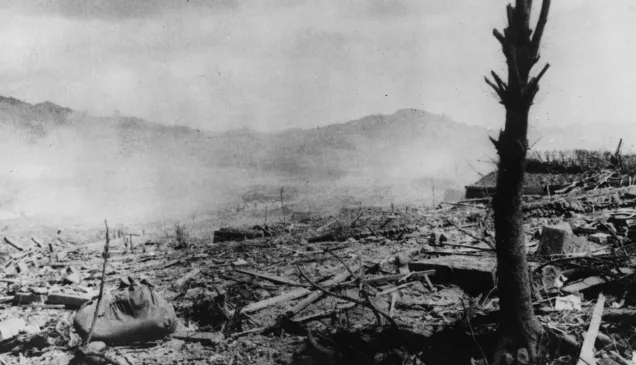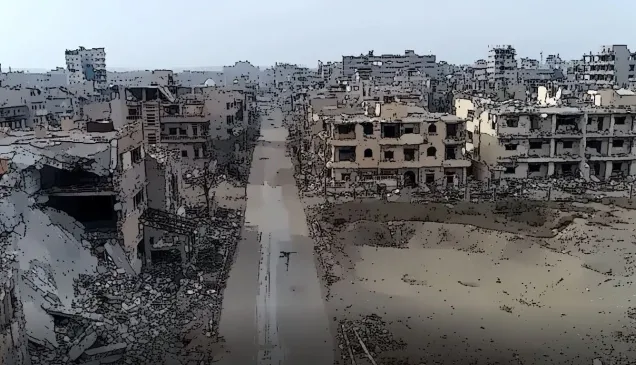Meeting discusses prohibition and elimination of nuclear weapons
On 17-18 February 2016 the Institute for Security Studies (ISS), the International Law and Policy Institute (ILPI) and the ICRC co-hosted a regional roundtable on the prohibition and elimination of nuclear weapons in Pretoria, South Africa.
The purpose of the roundtable was to bring together key government stakeholders from the African continent to discuss both substantive and process-related aspects of an international legally binding instrument prohibiting nuclear weapons, and the feasibility, scope and potential elements of such an instrument. A key issue to be explored was the role of Africa and African states in this endeavour.
The roundtable gathered 20 participants from 12 different countries, of which 9 were African. Participants from governments, international organisations and civil society were invited in their personal capacity and engaged in lively and constructive debates. The roundtable took place under the Chatham House rule, and was moderated by the ISS, ILPI and the ICRC.
The discussions were divided into four sessions: the humanitarian initiative so far; elements of a prohibition; negotiating a prohibition; and building African leadership. Following an update on the phases that have taken place in the humanitarian consequences process to date, participants noted that one of the main achievements of the humanitarian initiative is that it has allowed states and civil society the opportunity to challenge the status quo. Currently the international community's focus is on the UN Open Ended Working Group on Taking Forward Multilateral Nuclear Disarmament Negotiations (OEWG). Concerns were voiced about the potential outcomes of the OEWG, but participants seemed to agree that the involvement and participation by African states in the OEWG was crucial in the process towards prohibiting nuclear weapons. Participants then considered and reflected on the process going forward and what the elements of a legally binding instrument would be. Several participants suggested that while a simple prohibition treaty might not be the ideal way forward, it could constitute an important interim step towards the goal of complete elimination in that it would have an important stigmatizing effect and would render nuclear weapons unethical. The next step could then involve mobilizing the international community to negotiate a comprehensive convention at a later stage. Another option discussed was that of a framework agreement, whereby different legal elements could be added gradually through protocols. The main benefit of this approach was seen to be that it could increase the likelihood of umbrella states taking part in the negotiations.
During the discussion on the negotiation of the proposed measures, participants underlined the importance of inter-regional efforts with like-minded regions. Participants also emphasized that African states have demonstrated their valuable leadership role in other disarmament processes, including the Convention of Cluster Munitions and Arms Trade Treaty. It was suggested that stakeholders needed to create an African momentum. This could be done through a regional meeting and through involving Parliamentarians and high-level politicians in the debate. Several participants also suggested that the issue of African solidarity is crucial, as is a strategy to encourage and involve African policy makers. Noting that the issue of nuclear weapons is not considered a priority in Africa, discussions reflected on ideas to persuade African politicians otherwise. Participants highlighted the important role of African civil society, and noted that it is imperative that awareness of nuclear weapons disarmament is raised in every possible forum, through cooperation with and empowerment from African states. Stakeholders should also consider the role and value that National Red Cross and Red Crescent Societies may provide in this process.
Outcomes
Suggestions for the way forward and follow up actions included the following:
- Build on measures that already exist, such as the Ezulwini Consensus
- Consider lessons learnt from previous disarmament processes
- Increase partnership with African civil society and academia
- Increase information sharing within the African groups
- Raise awareness though media platforms, including opinion editorials in national newspapers
- Consider a coalition between the nuclear weapon-free zones
- Engage in sensitizing activities with parliamentarians and politicians
- Use National International Humanitarian Law Committees to raise awareness nationally
- Use the upcoming 20th anniversary of the Pelindaba Treaty to create awareness regionally
- Use the humanitarian pledge as a tool to mobilize states
- Undertake research on the impact of past nuclear weapons testing on African soil
- Potentially promote a ban treaty as part of the strategy for a nuclear weapon-free world
- Consider organizing a regional African meeting to discuss ideas of a common position on the issue of a legally binding instrument against nuclear weapons



